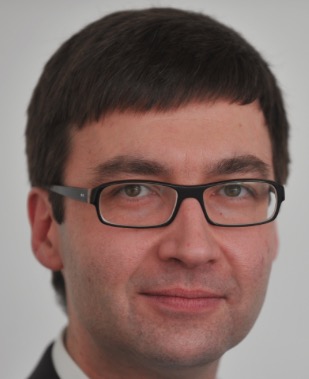Watch out! “Parishes of the New Type” are coming!

German Journalist: Shortage of Priests is Intentional to make way for “Participatory Churches”
German author and journalist Alexander Kissler (pictured above) has published an article on the catastrophic state of the Novus Ordo Sect in his country, with the provocative title: “The Shortage of Priests is Intentional”. A brief synopsis reads: “The number of new priests is declining constantly. Behind this decline lies a strategy. Priests are an obstacle to the new type of church that many diocesan leaders want.”
Kissler’s article was published in Cicero, a magazine for culture and politics based in Berlin, on August 18, 2016. We have translated it in its entirety and are publishing it here:
We are used to it; it only merits a side note that the Catholic Church in Germany is running out of priests. The past year marks a historic low. Only 58 men were ordained priests in 2015. There have never been fewer. Two years earlier the number of new priests was almost 100, according to statistics. Diocesan offices are shedding crocodile tears. There is talk of changed circumstances, of crises of public perception, of the economics of clerical life, of a lack of commitment. Some penitentially beat their breasts and dredge up the scandals of the past. But the shortage of priests is in fact intentional. In the new church of participation, priests are in the way.
“Parishes of the New Type”
There was no vote, no directive from Rome that the Catholic Church in Germany would have to take this and no other path. The Germans are simply doing it, and as good Germans, they’re doing it thoroughly. Take the diocese of Limburg. There the diocesan leadership is working energetically on a “Parish of the New Type,” informally abbreviated as “PNT.” There are at least 30 “PNTs” between Frankfurt, the Taunus area, and the Westerwald region. In the pertinent documents, the priest appears either not at all or only as a curiosity, [as] a rigid, marginalized relic. Full-time employees and volunteers are to work together as directed by parish consultants and process facilitators. It’s spiritual government.
The publication “Parishes of the New Type — Current Issues — Summer 2016” of the Limburg “Program Management for Parish Formation,” prints what can regrettably be put thus in German: There is a desire to “risk a new beginning,” to “dare to look beyond the worship community,” as though it required special daring to chime in with the prevailing spirit of the times. There is a firm intention to back “gender equality” and “participation.” The “pastoral workshop” has reportedly already achieved “an important” goal, namely, “participation.” Not everywhere, of course; in some cases additional “rounds of consultation” are still needed. After all, “the PNT process was introduced from the top down all throughout the diocese”. Step by step, the church is now thought to become “capable of connecting with the reality of people’s everyday life.”
Recatholicizing Luther, Lutheranizing the Church?
Stubborn priests only delay annexation with the wonderland of participation. One participant of the “pastoral workshop” is prominently quoted as issuing a threatening warning to the diocesan administration to “urge priests more insistently and more consistently not to stand in the way of change.” Priests are “not to impede [change in] an entire parish.” Thus the ordained senior staff are shown the instruments of the torture of disciplinary action. Padres who won’t obey had better brace themselves. The next page says “the parish itself has to seek out [people]”, which makes it clear that it can also look for new leaders, for new forms of management”. Any priest can always be consigned to an outbuilding. What do haughty “results-oriented thinkers and sensitivity advocates”, “enablers, motivational experts, perspective providers, [and] overseers of the system” care about canon law or catechism? The word “priest” does not appear in Limburg’s self-portrait “Church of the Future”. And in the final document of the “pastoral workshop”, [the word “priest”] is mentioned especially as [part of] a “shared priesthood” and a “universal priesthood” — the latter being fiercely Protestant wording, incidentally. Is Luther to be recatholicized, or is the [Catholic] Church to be lutheranized?
Limburg is symptomatic of the Philippine model, which other dioceses, too, have decided on for their appointed flocks. The shrinking church in Germany is to become a grass-roots participatory society of the committed. The work of the pastoral institute Bukal ng Tipan in the Philippines serves as a model here, [a place] where almost every diocese sends its agents by now. These expensive, church-tax-funded educational trips are resplendent for their internationalism, a dash of exoticism, and a low-threshold existential piety. The plan is to create a humanitarian action community that is not decidedly devoid of priests altogether but has [substantially] fewer priests: “journeying with people towards a participatory church.”
In this way the Catholic Church has created for itself a problem that goes to its very root. As is well known, the Church is centered on the Eucharist, whose essence is the change of bread and wine into the Body and Blood of Christ, which only a priest can set in motion [sic]. Thus says dogma. In this role, the priest cannot be replaced. Where he is absent, there can never be more but only less and less Church, theologically speaking. Yet the new church of participation rests on the fiction that anyone can do anything, that anyone can be entrusted with anything, that everything can be delegated, that any person can be exchanged for any other. This is what a streamlined present yells into ears trained to respond to the marketplace. At the current time a lot of diocesan administrations would rather dress up the [Church’s] quantitative decline using managerial rhetoric than to compromise on its primary and ultimately ecumenical super-dogma: At all costs, the churches want to avoid offending anyone. They have changed from being a sign of contradiction to becoming social organizations no one could have a problem with. Thus they decline rapidly, singing insipid tunes.
(Alexander Kissler, “Der Priestermangel ist gewollt”, Cicero, Aug. 18, 2016; our translation.)
Indeed, the shortage of Novus Ordo priests is intentional, as is all the other infernal work that has been committed by the Novus Ordo Sect since Angelo Roncalli usurped the papacy in 1958. What Dr. Kissler is describing in the above article is simply the next, perhaps last, stage in the inevitable decline of the pseudo-Catholic sect that has been poisoning souls for nearly 60 years.
What’s amusing is that the Vatican II Modernists are still frantically trying to be “relevant” to modern man, to the “reality of everyday life”, when it is precisely this very attempt that has made them irrelevant in the first place. The moment one tries to conform Catholicism to modernity is the moment that Catholicism starts to become irrelevant, and this is not only true in theory but has also been verified in practice. Just look at the results. The New Theologians of Vatican II got what they wanted — they got their “modern, relevant” church, and look at it all now. As our Blessed Lord had said: “ Even so every good tree bringeth forth good fruit, and the evil tree bringeth forth evil fruit… Wherefore by their fruits you shall know them” (Mt 7:17,20).

What? Still not relevant enough for you?!
“Bishop” Franz-Josef Bode of Osnabruck with one of his presbyters (more fun here)
In January 2015, we had already published a blog post reporting on the catastrophic state of “Catholicism” in the country of Martin Luther. Now is a perfect time to review it:
A church that tries to serve and chase after the spirit of the times is not a church that anyone can take seriously as a spiritual authority, and this is one of the many reasons why the Vatican II Church is doomed to failure.
Image source: Wikimedia Commons / bonifatiuswerk.de (Patrick Kleibold)
License: CC0 1.0 / fair use



No Comments
Be the first to start a conversation